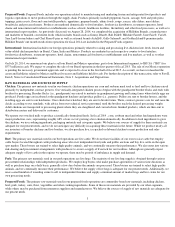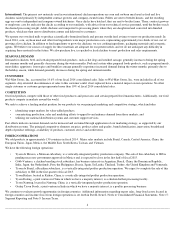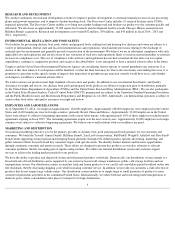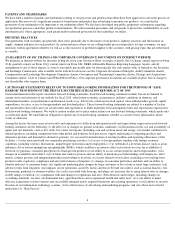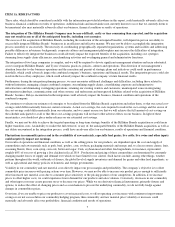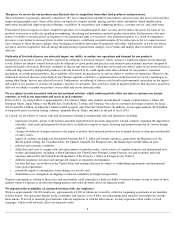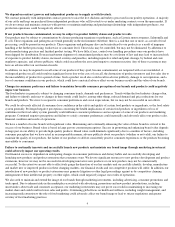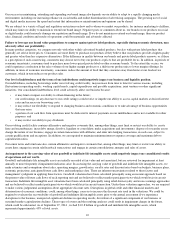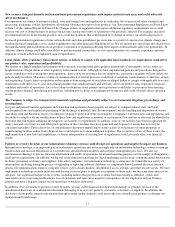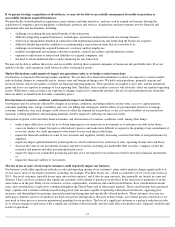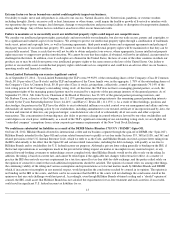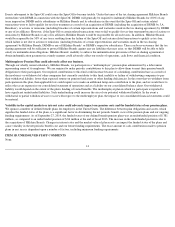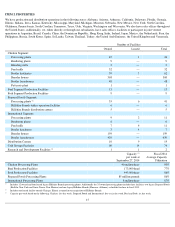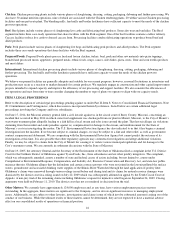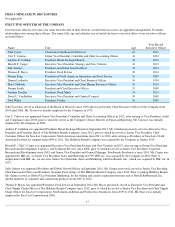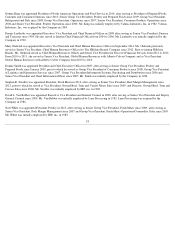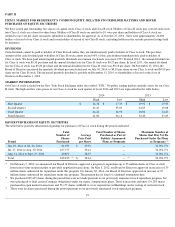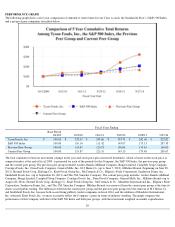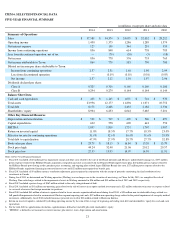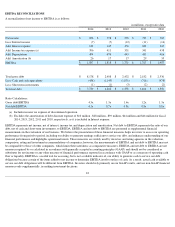Tyson Foods 2014 Annual Report Download - page 15
Download and view the complete annual report
Please find page 15 of the 2014 Tyson Foods annual report below. You can navigate through the pages in the report by either clicking on the pages listed below, or by using the keyword search tool below to find specific information within the annual report.
Extreme factors or forces beyond our control could negatively impact our business.
Our ability to make, move and sell products is critical to our success. Natural disasters, fire, bioterrorism, pandemic or extreme weather,
including droughts, floods, excessive cold or heat, hurricanes or other storms, could impair the health or growth of livestock or interfere with
our operations due to power outages, fuel shortages, damage to our production and processing facilities or disruption of transportation channels,
among other things. Any of these factors could have an adverse effect on our financial results.
Failure to maximize or to successfully assert our intellectual property rights could impact our competitiveness.
We consider our intellectual property rights, particularly and most notably our trademarks, but also our trade secrets, patents and copyrights, to
be a significant and valuable aspect of our business. We attempt to protect our intellectual property rights through a combination of trademark,
trade secret, patent and copyright laws, as well as licensing agreements, third-party nondisclosure and assignment agreements and policing of
third-party misuses of our intellectual property. We cannot be sure that these intellectual property rights will be maximized or that they can be
successfully asserted. There is a risk that we will not be able to obtain and perfect our own or, where appropriate, license intellectual property
rights necessary to support new product introductions. We cannot be sure that these rights, if obtained, will not be invalidated, circumvented or
challenged in the future. In addition, even if such rights are obtained in the United States, the laws of some of the other countries in which our
products are or may be sold do not protect our intellectual property rights to the same extent as the laws of the United States. Our failure to
perfect or successfully assert our intellectual property rights could make us less competitive and could have an adverse effect on our business,
operating results and financial condition.
Tyson Limited Partnership can exercise significant control.
As of September 27, 2014 , Tyson Limited Partnership (the TLP) owns 99.985% of the outstanding shares of the Company's Class B Common
Stock, $0.10 par value (Class B stock) and the TLP and members of the Tyson family own, in the aggregate, 1.78%
of the outstanding shares of
the Company's Class A Common Stock, $0.10 par value (Class A stock), giving them, collectively, control of approximately 70.14% of the
total voting power of the Company's outstanding voting stock. At this time, the TLP does not have a managing general partner, as such, the
management rights of the managing general partner may be exercised by a majority of the percentage interests of the general partners. As of
September 27, 2014 , Mr. John Tyson, Chairman of the Board of Directors, has 33.33% of the general partner percentage interests, and
Ms. Barbara Tyson, a director of the Company, has 11.115% general partner percentage interests (the remaining general partnership interests
are held by the Tyson Partnership Interest Trust ( 44.44% ) and Harry C. Erwin, III ( 11.115% )). As a result of these holdings, positions and
directorships, the partners in the TLP have the ability to exert substantial influence or actual control over our management and affairs and over
substantially all matters requiring action by our stockholders, including amendments to our restated certificate of incorporation and by-
laws, the
election and removal of directors, any proposed merger, consolidation or sale of all or substantially all of our assets and other corporate
transactions. This concentration of ownership may also delay or prevent a change in control otherwise favored by our other stockholders and
could depress our stock price. Additionally, as a result of the TLP's significant ownership of our outstanding voting stock, we are eligible for
“controlled company” exemptions from certain corporate governance requirements of the New York Stock Exchange.
We could incur substantial tax liabilities as a result of the DEMB Master Blenders 1753 N.V (“DEMB”) Spin-Off.
On June 28, 2012, Hillshire Brands divested its international coffee and tea business segment through the spin-off of DEMB (the “Spin-Off”).
Hillshire Brands intended for the Spin-Off and certain related transactions to qualify as tax-free under Sections 355, 368(a)(1)(D), and 361 and
related provisions of the U.S. Internal Revenue Code, which we refer to as the Code, and Hillshire Brands received a private letter ruling from
the IRS substantially to the effect that the Spin-Off and certain related transactions, including the debt exchange, will qualify as tax-free to
Hillshire Brands and its stockholders for U.S. federal income tax purposes. Although a private letter ruling generally is binding on the IRS, if
the factual representations or assumptions made in the private letter ruling request are untrue or incomplete in any material respect, or any
material forward-looking covenants or undertakings are not complied with, then Hillshire Brands would not be able to rely on the ruling. In
addition, the ruling is based on current law, and cannot be relied upon if the applicable law changes with retroactive effect. As a matter of
practice the IRS does not rule on every requirement for a tax-free spin-off or tax-free debt-for-debt exchange, and the parties relied solely on
the opinion of counsel for comfort that such additional requirements should be satisfied. The opinion of counsel relies on, among other things,
the continuing validity of the ruling and various assumptions and representations as to factual matters made by Hillshire Brands and DEMB
which, if inaccurate or incomplete in any material respect, would jeopardize the conclusions reached by counsel in its opinion. The opinion is
not binding on the IRS or the courts, and there can be no assurance that the IRS or the courts will not challenge the conclusions stated in the
opinion or that any such challenge would not prevail. Accordingly, even though Hillshire Brands obtained a ruling and a “should” opinion of
counsel, the IRS could assert that Hillshire Brands has not satisfied the requirements for tax-free treatment and such assertion, if successful,
could result in significant U.S. federal income tax liabilities for us.
13


